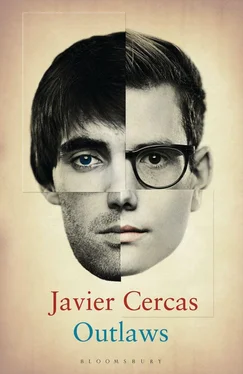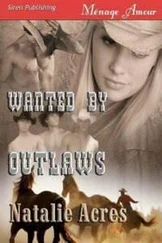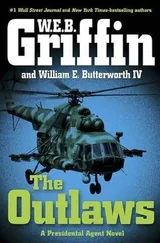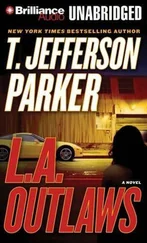‘That’s where the six links end, and that’s all I remember.’
‘So you abandoned Zarco.’
‘What was I going to do? What would you have done? He couldn’t save himself; I couldn’t save him: sacrificing myself would have been stupid, it would have done no good. So I decided to save myself. It’s what Zarco would have done; that’s why he told me to run, to go. And maybe that’s why he fought with the police (or that’s why I’ve always thought he fought with them): to give me time to get away, so I could save myself.
‘That’s what I did. I ran through the empty park like a flash, passed the football pitch, the rifle range and the model-plane runway and ended up taking shelter in a grove of poplars stuck in between the Ter and the Güell, between the sports pavilion and the municipal dump. Dazed, I stayed in that hiding place for a while, trying to get over my fear, the pain of my wounded arm and the buzzing in my head. Although the buzzing soon stopped, the wound wouldn’t stop bleeding and the fear rushed back when the police helicopter flew low over the grove a couple of times, but I managed to think with sufficient clarity to understand that I should get out of there immediately and that I only had one safe place to go.
‘Making sure no one saw me, I left the poplar grove, got to Caterina Albert and went home.
‘When I got there everything happened very fast. When I went in, my whole family was eating. My mother and my sister cried out to high heaven when they saw my T-shirt soaked in blood; my father reacted differently; without a word he took me to the bathroom and, while I explained to all of them that I’d fallen off a motorcycle, he examined my wound. Once he’d examined it, my father asked my mother and sister to leave the bathroom. This is not from a fall, he said coldly when they left, pointing at my arm. Go on, tell me what happened. I tried to insist on my lie, but my father interrupted me. Look, Ignacio, he said. I don’t know what mess you’ve got into, but if you want me to help you, you have to tell me the truth. Without affection, he added: If you don’t want me to help you, you can leave. I understood he meant it, that he was right and that, no matter how badly he reacted to the truth, it would be a thousand times worse if the police arrested me; besides, by then I was coming down hard off the adrenaline and was so scared it was as if I’d injected myself in one single shot with complete awareness of the danger I’d exposed myself to in my forays of the past months.
‘I agreed. As best I could I told my father the truth. His reaction calmed me down a little, almost disconcerted me: he didn’t yell at me, didn’t get furious, he didn’t even seem surprised; he just asked me a few very specific questions. When I thought he’d finished I asked: What are we going to do? He didn’t even take a second or two to think. Go to the police station, he answered. A chill made my legs go weak. You’re going to give me up? I asked. Yes, he answered. You said you’d help me, I said. That’s the best thing I can do to help you, he said. Dad, please, I begged. My father pointed at my wound and said: Wash that off and let’s get going. Then he left the bathroom and, while my mother came back in and washed the wound with the help of my sister, I heard him speaking on the phone. He spoke for quite a while, but I didn’t know what about or with whom, because the telephone was in the front hall and my mother and my sister were harassing me with questions; they were also trying to comfort me, because I’d started to cry.
‘Back in the bathroom, my father asked my mother to pack a suitcase for him and for me. I looked at him with my eyes full of tears; my father looked at me as if he’d just recognized me or as if he was about to burst into tears as well, and at that moment I knew he’d changed his mind, and that he wasn’t going to turn me in. Where are you going? my mother asked. Pack the suitcase, my father repeated. I’ll explain later. In silence and without looking at my face again, my father finished cleaning out the wound, disinfected and bandaged it. When he finished he left the bathroom and for a couple of minutes I heard him speaking to my mother. He came back to the bathroom and said: Let’s go.
‘I followed him without questions. First we went to Francesc Ciurana Street and parked outside the door of a building where a close family friend lived, a lawyer from my parents’ hometown called Higinio Redondo. My father got out of the car and asked me to wait and, while I waited, I deduced that it had been Redondo he’d spoken to on the phone, after I told him what happened. After a while my father returned to the car alone and we crossed the city and left it by the highway to France. On the way he told me we were going to a summer home that Redondo had just bought in Colera, a remote coastal village; he assured me that, if the police went looking for me at home on Caterina Albert (something which was highly probable), my mother would not hide our whereabouts; he explained in detail what I had to tell the police in the event, also highly probable, that they came to Colera to interrogate me (what I had to say was, in short, that we’d spent a week there, just the two of us, stretching out the last days of the summer holidays). An hour later we arrived in Colera. The village streets were deserted; Redondo’s house was very close to the sea. As soon as we got in, my father started unpacking our things and arranging them in the wardrobes, or rather disarranging them and messing up the dining room, the kitchen, the bathroom and bedrooms, so it would look like a house where we’d been living for several days. Then he went shopping and I stayed in one of the rooms, lying on the bed and watching a tiny portable television. I hadn’t recovered from the fear or the exhaustion. I fell asleep. When my father woke me up I didn’t know where I was. Someone had turned off the TV and the light in the room was on. My arm didn’t hurt; I vaguely sensed that it was night-time. There’s someone out there who wants to talk to you, my father whispered. He’d crouched down beside me; running his hand down my other arm he added: It’s a policeman. He didn’t say anything else. He stood up, left the room and Inspector Cuenca came in.’
‘Did you know him?’
‘Of course. And he knew me. We’d often seen each other in the district and he’d interrogated me at least a couple of times. That night he interrogated me too. Standing beside the bed, without asking me to get up — I had sat up just a bit: I was sitting on the mattress with my legs flexed and my back leaning against the wall — he asked the predictable questions and I gave him the answers my father had told me to say. While I was speaking I read in the inspector’s eyes that he wasn’t believing me; he didn’t believe me: when the interrogation was over he told me to get dressed, to pack some clothes in a bag, that I had to go with him. I’ll wait outside, he said, and walked out of the room.
‘I realized that all was lost. I don’t know exactly what happened during the minutes that followed. I know that fear suffocated me and I didn’t obey the inspector and didn’t get up off the bed; I know that I battled the imminence of the catastrophe by imploring in silence that all that had happened over the past three months hadn’t happened or had been a dream, and that I implored as if I were crying or as if I were praying, begging for a miracle. No miracle occurred, although what did happen is the closest thing to a miracle that has happened in my life. And do you know what it was?’
‘What?’
‘Nothing. At some point the door to my room opened and Inspector Cuenca appeared. Naturally, I thought it was the end. But it wasn’t; in fact, it was the beginning. Because what happened was that Inspector Cuenca just stood there, silent, standing still, looking at me for a couple of endless seconds. And then he left.
Читать дальше












